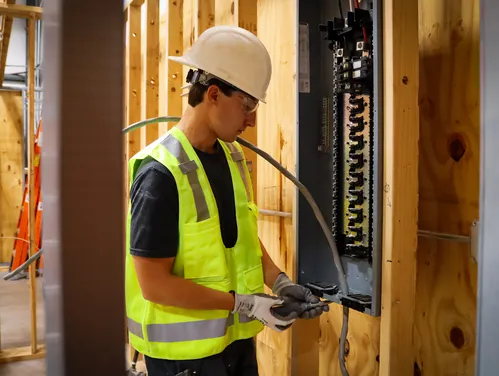During a typical spring semester, seniors from four high schools do internships with Team Kline, a mechanical, electrical and plumbing company based in Des Moines with projects across the Midwest. At residential sites, 17-year-olds use hammers and other hand tools to help with electrical rough-in while 18-year-olds with additional training assist with installing plugs and switches and other work with power tools.
All are building promising new careers while helping Kline construct its most successful pipeline for bringing new employees into the company.
Interns work under the watchful eyes of Journeyman Electricians, who have students regularly take time to observe more complex tasks. Impressively, 89 percent of students in Kline’s intern program become Registered Apprentices with Kline after high school graduation, and 100 percent of completers – who earn a valuable national credential - have continued to work for Kline, said Kylie Ayala, Kline’s Employee Development Coordinator.
Internship “beats all of our other hiring practices” for success with retaining new employees, said Ayala. She attributes that to several things: Interns are treated as members of the team from Day 1. Rather than being relegated mostly to clean up, they have a lot of opportunities to learn. It’s important for interns to be well-organized, she said, so they have an assigned mentor for every shift and to be realistic about what they can do.
Kline coordinates with high schools to schedule around classes. That translates into various arrangements, from interns training daily from 1 p.m. to 3:30 p.m. to putting in 40 hours a week after completing required high school courses. Altogether, Kline has had 27 apprentices over the last five years. Students who prepare for the experience – such as taking related classes junior year – are ahead of the game, said Ayala, a Licensed Journeyman Electrician in Iowa who also holds an Electrical Contractors License in Nebraska and teaches Kline’s Registered Apprenticeship courses in-house in partnership with Hawkeye Community College. In the summer, Kline often hires high school interns on their own.
Safety is top priority, which is why Kline's younger interns usually learn at residential sites instead of larger commercial job sites, Ayala said. Before launching its intern program, Kline did research to make sure it complied with state and federal employment laws and met insurance requirements. In case of workplace injuries, interns are covered by workers’ compensation like other employees since they are paid, she said.
“For students, this really is something they want to do, and Kline is investing in them as much as they are investing in Kline,” said Ayala. Besides, “sometimes the return on investment can’t be calculated in dollars when we work with youth and provide the opportunity to get into the trades.”
Gavin Sosa, 21, now a fourth-year electrical apprentice, said working for Kline during the summer before his senior year at Ankeny Centennial High School was an “amazing” experience.
“It was extremely hard physical labor, but I loved working with my hands,” he said. “And it was the community at Kline. They were welcoming and willing to help me grow and learn and take this next step in life. It made that transition from high school to working more comfortable.”
During on-the-job training as a Registered Apprentice, Sosa has worked in all kinds of settings, including residential, commercial, industrial, and even solar. Classroom learning takes place every spring, and he hopes to complete his apprenticeship and become a Licensed Journeyman in mid- to late 2026.
“Being a serviceman has taught me so much about the electrical industry and how to think outside the box and troubleshoot. I like figuring how out to problem-solve, be code compliant and make the work look good.”
What is Sosa’s advice for employers who are thinking about starting an internship program?
“To make an internship program successful, the key is support systems for your incoming interns," he said. "It helps to have people around you who are like-minded, motivated and disciplined. When questions arise, be patient and guide them and let these young people grow into this trade they are interested in.”
Connect With WBL Opportunities
Are you a student interested in an experience similar to the story above, or an employer looking to sponsor a related WBL program? Iowa Workforce Development and the Iowa Department of Education have the resources you need to be successful in WBL.
